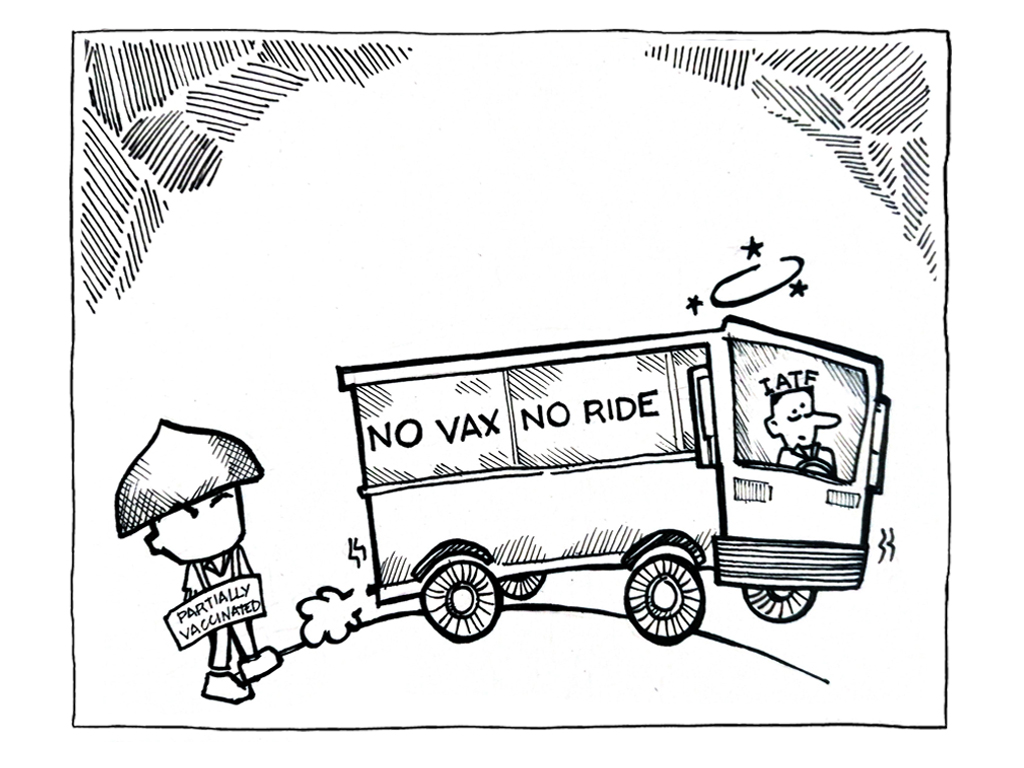This Week in Media (January 17 to 21, 2022)
Media document more belated, confusing policies
MORE AND more bad news top the end of the first month of 2022 – the continuing increase of COVID cases across all island groups, the death of two unvaccinated individuals who contracted the Omicron variant, hospital systems overwhelmed, even the shortage of paracetamol and over-the-counter medicine for colds and flu demonstrate the fragility of the national system for healthcare.
The government is in frantic catch-up mode, rolling out interventions to make available vaccination in pharmacies and planning to distribute home care kits to vulnerable individuals.
These are not entirely new approaches. In two separate reports, the Inquirer cited Dr. Tony Leachon, health reform advocate, and Rep. Rodolfo Ordanes of the Senior Citizens Party-list, who both said they had recommended tapping drugstores for vaccination last year. Rappler also reported that the Office of the Vice President (OVP) has been providing since April 2021 home care kits to those who availed of the OVP’s online consultation program. Rappler also noted that the OVP’s kit provided more supplies than the kit of DOH.
The DOH kits are still awaiting distribution, but the pilot run of the in-pharmacy vaccination on January 20 caused some confusion, a usual problem in the way the Duterte administration implements its policies. A 24 Oras report cited the case of an individual who registered directly with the pharmacy, only to be told that she should have registered with the local government unit (LGU).
That individual could not be blamed. Prior to the rollout, only a few reports on print, online and TV identified where interested individuals should register, but these did not check that two officials actually gave different instructions. Some articles quoted Karlo Nograles, acting presidential spokesperson, saying registration should be with the LGU. Other reports cited Vivencio Dizon, testing czar, saying interested individuals can sign up with the participating pharmacies.
No vaccine, no ride policy
The week opened with the implementation of the “no vax, no ride” policy. TV news captured footage of desperate and irate commuters who were denied access to public transport, some of them still awaiting their second doses. News coverage followed up with the clarification of Silvestre Bello III, Labor secretary, that workers were exempted from the policy. But Artemio Tuazon, a Transport undersecretary, issued another clarification, saying that the only workers exempted are those employed with companies or businesses that are allowed operation under Alert Level 3.
Officials were issuing clarifications up to the third day of implementation, but the media have not called out this pattern of incompetence. Journalists have not confronted how the IATF actually decides on its policies, and whether it still acts as a collegial body.
CMFR jeered the one-sided report of GMA News Online that conveniently left out the issues experienced on Day 1 of the “no, vax no ride” policy, claiming smooth implementation based only on the statement of the spokesperson of the PNP.
Elections
On January 17, media reported that dismissal of one petition to cancel the certificate of presidential candidate Ferdinand “Bongbong” Marcos, Jr., by the Second Division of the Commission on Elections (Comelec). Reports did say that Atty. Theodore Te, legal counsel of the petitioners, will file a motion for reconsideration.
CMFR cheered Rappler’s story that answered frequently-asked questions on the pending disqualification cases against Marcos in the First Division, providing scenarios that could unfold, depending on when the decision is made as the law allows this to be indefinite, which could make the resolution moot and irrelevant.
Media also reported senatorial slate announcements of the Marcos-Duterte tandem and of the opposition coalition 1Sambayan. So far, the news have not carried information on backgrounds and qualifications of these candidates for public consideration and scrutiny.
The Philippine Center for Investigative Journalism (PCIJ) reported ad spending of candidates on Facebook, identifying Vice President Leni Robredo as the biggest spender. The report pointed out that Marcos has no recorded Facebook ad spending so far, noting that the Marcos campaign depends more on memes.
CMFR cheered ANC’s follow-up on PCIJ’s story, an interview with Jonathan Ong, an associate professor at the University of Massachusetts Amherst who has studied disinformation networks. Ong said Marcos operates on a different level, using influencers, memes and parody pages which are harder to monitor and regulate.
Other news organizations have not picked up on Ong’s insight. The campaign of Marcos is costly, but these costs go under the radar of campaign fund checks.
Human rights
Print and online news reported that on January 17, the House of Representatives approved on third and final reading the Human Rights Defenders Protection Bill, authored by Albay Rep. Edcel Lagman. The bill includes the guarantee of the protection of human rights defenders against intimidation and reprisal due to their work. Senators Leila de Lima and Risa Hontiveros filed a counterpart bill in 2019, still pending at the committee level.
Meanwhile, CMFR cheered Rappler for revisiting families of drug war casualties whose remains had been exhumed from public cemeteries and recalling the unexamined circumstances of their deaths.

Leave a Reply